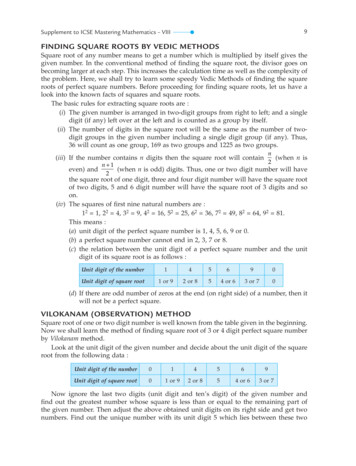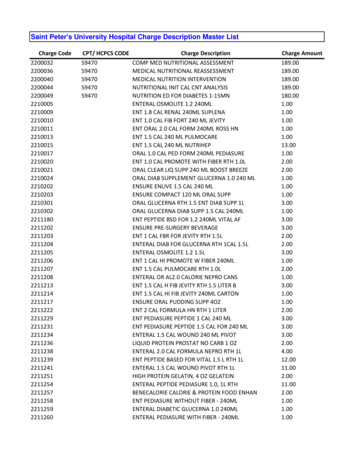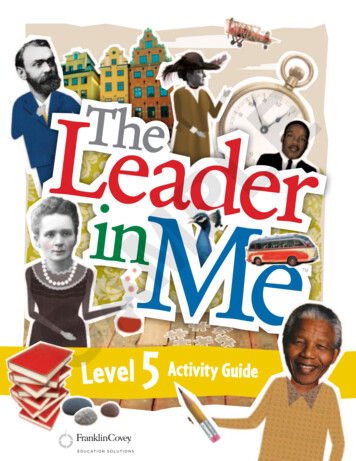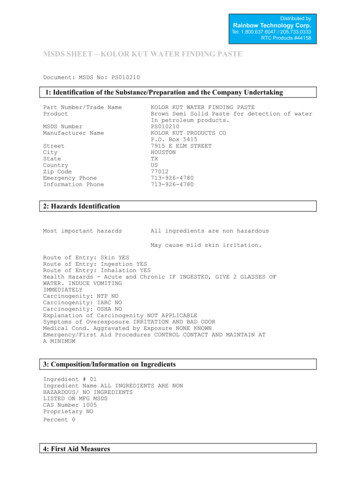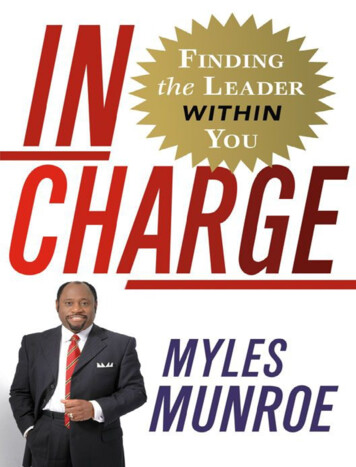
Transcription
Copyright 2008 by Myles Munroe All rights reserved. Exceptas permitted under the U.S. Copyright Act of 1976, no part ofthis publication may be reproduced, distributed, or transmittedin any form or by any means, or stored in a database orretrieval system, without the prior written permission of thepublisher.Unless otherwise noted, Scripture quotations are from theHOLY BIBLE: NEW INTERNATIONAL VERSION , NIV , 1973, 1978, 1984 by the International Bible Society. Used bypermission of Zondervan. All rights reserved. Scripturequotations marked (kjv) are taken from the King James Versionof the Holy Bible. Scripture quotations marked (nkjv) are takenfrom the NEW KING JAMES VERSION, 1979, 1980, 1982, byThomas Nelson, Inc. Used by permission. All rights reserved.Scripture quotations and source information have sometimesbeen set italic for author’s emphasis.FaithWordsHachette Book Group237 Park AvenueNew York, NY 10017Visit our Web site at www.HachetteBookGroup.com.First eBook Edition: November 2008
FaithWords is a division of Hachette Book Group, Inc.The FaithWords name and logo are trademarks of HachetteBook Group, Inc.ISBN: 978-0-446-54485-6
ContentsAcknowledgmentsAuthor’s ForewordIntroductionPART 1: DESTINED TO SERVE AND LEAD1: “I’m In Charge”: The Battery and the Wire2: Born to Lead, Prepared to Serve3: Why Lead?4: Who Is the Greatest?PART 2: THE SEVEN PRINCIPLES OF SERVANTLEADERSHIP5: This Is My Spot: Go Find Yours6: Who Died and Left You in Charge?: The Dominion Mandate7: Jockeying for Position: The Sons of Zebedee8: It’s Greek to Me: Out With Old Ideas9: Check the Reservations: Your Name Is on the Roll10: It Isn’t Yours to Keep: Sharing the Riches11: Leaders Are Made, Not Born: Self-Discovery Is the MainIngredient
PART 3: PREPARED TO SERVE12: Believe: The Power of Philosophy13: Prepare: The Toolbox of a Leader14: Refine: Be a Limited Edition15: Envision: Order My Steps16: Integrity: Protecting Your Gift17: Train: Who Will Come After You?AppendixEndnotes
OTHER BOOKS BY MYLES MUNROEApplying the Kingdom: Understanding God’s Priority andPrimary InterestGlory of Living: Keys To Releasing Your Personal GloryIn Pursuit of PurposeKingdom ParentingKingdom Principles: Preparing for Kingdom Experience andExpansion. (Understanding the Kingdom)Maximizing Your PotentialMost Important Person on EarthMyles Munroe 365 Day DevotionalRediscovering the Kingdom Devotional and JournalReleasing Your PotentialSingle, Married, Separated, & Life After DivorceThe Principles and Power of VisionThe Purpose and Power of Love & MarriageThe Spirit of LeadershipUnderstanding the Purpose and Power of Men: Study GuideUnderstanding the Purpose and Power of Prayer: EarthlyLicense for Heavenly InterferenceUnderstanding the Purpose and Power of VisionUnderstanding the Purpose and Power of WomanUnderstanding Your PotentialWaiting and Dating: A Sensible Guide to a Fulfilling LoveRelationshipThe Principle of Fatherhood
To the 6.7 billion people on earth searching for meaning andsignificance in life, believing deep inside that they were born todo more than survive, make a living and die.To the individual stuck in the human rat race and imprisonedby the notion that success in life is the accumulation ofmaterial things. My hope is that you be set free from the cycleof futility in pursuing goals set in life by your culture andsociety and discover the secret to your personal fulfillment.To the youth of our nations who seek purpose and meaningin life. May you discover the value and power of your inherentgift and become a leader in your generation by serving that giftto the world.To all the trustees and members of the International ThirdWorld Leaders Association! May you continue to manifest andmaximize the leadership capacity in you and others.To my son and daughter, Charisa and Chairo (Myles Jr.),who’s leadership potential inspired many of the principles inthis work. May you continue to follow your destiny to serveyour leadership gift to your generation.To the Source of all true gifts, the Creator of destinies andSustainer of life. May your truth explode in the hearts of allwho read these pages.
ACKNOWLEDGMENTSEvery accomplishment in life is the result of corporate effort.Just as it takes a village to raise a child, so it takes a team toauthor a book. Being aware that we are all a sum total of all thatwe have learned from all the people and experiences we havemet and had in our lives, no one can claim full credit of anymeasure of success in any endeavor. This book is no different.I want to thank my beloved wife Ruth, and my children,Charisa and Chairo (Myles Jr.), for their support, patience andcorporation while I pursue the many projects included in myearthly assignment. You are all my principle treasures. Thanksfor helping me manifest my inherent gift and allowing me toserve it to the world.Adrienne Ingram, who coordinated this project, forencouragement, input, dedication, motivation and continuedpursuit of me in getting this project done.Angela Dodson for your incredible gift, inspiration and skillin bringing the best of this content out of me. This work couldnot have been completed without you as you continually andconsistently demonstrated the very principle in this book—servant leadership. I am eternally grateful and will alwaysremember your contribution through your gift.
AUTHOR’S FOREWORDTaught to Serve, Not to LeadIt was a beautiful sun-drenched morning in my village calledBain’s Town on the little island twenty miles long and sevenmiles wide called New Providence, also home of our capital,Nassau. Over two hundred of us, just six and seven years old,stood outside on the hard dirt ground, wearing our neatlypressed green and white school uniforms. Each of us held atwelve-inch stick to which was attached a cloth print of theFlag of the United Kingdom of Great Britain, called the UnionJack. At nine o’clock in the morning, the temperature wasalready ninety degrees, but we were commanded to not move amuscle. Droplets of perspiration fell from my brow and into mymouth. It was Commonwealth-Flag Day, and we were keeping along-standing tradition of our imperial rulers.All over the island, every school was mandated to gather allstudents in assemblies to honor the Queen of Great Britainthrough patriotic songs, recitations of British poetry andcorporate pledges to our monarch and the empire for whichthey stood. We were all called colonies and knew we wereconsidered second-class subjects of Her Majesty and the GreatUnited Kingdom of Great Britain.I was participating in the same ceremony as countlessmillions of others throughout the commonwealth of GreatBritain. We were all subjects of “colonies” of European
kingdoms. These kingdoms included Great Britain, France,Spain, Portugal, Belgium and Holland. Colonization impactedmost of the world, including Central and South America, Africa,India, the Pacific Islands, Asia, North America, and theCaribbean Islands, where I was born.On that hot Commonwealth Day morning under thatscorching, uncovered sun, we sang the songs of the Empire, aswe did every morning. As uniformed children, we enjoyedsinging these songs, each of us straining to be heard abovethe others. I did not know the mental impact of these imperialpsalms. They were brainwashing, converting, conditioning andeventually shaping the self-concept, self-worth, self-esteem,and perception of the world in which we would live. Thesesongs also reinforced the books used in each classroom by ourBritish teachers, volumes that only spoke of the English life,culture and history. We were to be convinced that all that wasBritish was good, and honorable, superior, and just.However, the most vile impression on our young minds wasthat we were born to serve and worship the empire, that wewere not capable of leadership. We were conditioned to“depend” on the colonial powers for life and value, trained thatwe could not determine our own destinies, chart our ownfuture, plan our lives.The precepts we, and those in colonies on every continent,were taught from the cradle throughout the entire span of lifestill affect us this very day in our post-colonial era. Here arewords of songs we were made to sing every day; keep in mindthat these were sung by the offspring of those who had beenenslaved: When Britain first at Heav’n’s commandArose from out the azure main;Arose, arose from out the azure main;
This was the charter, the charter of the land,And guardian angels sang this strain:Rule, Britannia! Britannia, rule the waves!Britons never, never, never shall be slaves!Rule, Britannia! Britannia, rule the waves!Britons never, never, never shall be slaves!Or the favorite one:God save our gracious QueenLong live our noble QueenGod save the Queen!Send her victorious,Happy and glorious,Long to reign over us,God save the Queen!The statements that had the greatest impact on ourimpressionable minds were: “Britons never, never, never shallbe slaves” and “Long to reign over us.”These songs were sung by millions in the colonies of Africa,Asia, the Americas, and the Caribbean. We sang both of thesestatements while we were slaves and subjects of the imperialpowers. “They would never be slaves” while we were enslavedat the time we sang. Can you imagine the psychologicalimplications?The results of this experience was independent nations ledby and composed of peoples who were robbed of their senseof self, self-worth, self-confidence, and belief in their abilities tolead. Most nations that are products of this colonization-
mental conditioning have struggled and continue to strugglewith the leadership issues.It is ironic that the former colonizers and imperial powersblame and accuse these new, developing nations for their lackof effective leadership, when in fact they created the poorleaders who often govern these nations.Colonization and imperial oppression throughout historyresulted in the failure to mentor, develop, cultivate, andproduce leaders. The oppression that permeated the Americansociety had the same result. The Found-ing Fathers of Americawere products of the society that perpetrated colonization andthe philosophy of superiority through domination. Hence, theslave trade thrived in the early years of the Federation of theUnited States of America, and the formally oppressed peoplesof the American society— such as the American Indians andthe Negro slaves— struggle today with the issue of effectiveleadership development in their communities.Oppression never produces leadership but suffocates thegreat leadership potential that resides in every human.
My Journey of DiscoveryFrom this context, I emerged to face life and grapple with theinternal need to find significance. The mental conditioning thatI was “born to be ruled” and destined by providence to be a“slave” were my opposing forces. When I was young, I had noidea that this was a psychological oppression practiced as farback as the Egyptian civilization that permeated the empires ofthe Greeks and Romans, and became the thread runningthrough the fabric of the colonial tapestry of the so-called NewWorld.So standing there in the heat of the Caribbean sun, I wasbeginning a journey to discover that I was not “born to beruled” nor destined to be a follower trapped by providence to alife of subjugation.It took years for my mind to be delivered from the historicaldamage of oppression and to understand not only that I wascapable of becoming a leader, and destined to be one, but alsothat every human on this planet was created for the purpose ofleadership and possessed leadership capacity and potential.This book is about that discovery. It’s about you and thepotential you possess to become an influence in your worldand future generations.True leadership does not maintain followers but producesleaders. That is what this book is about. I will address thishistorical scar on the psyche of the human race and providethe insight, tools and understanding necessary to free eachindividual from the shackles of oppression. I want to challenge
and dare you, as an aspiring leader, to discover the truth aboutleadership that no human can cancel if you embrace it.
INTRODUCTION
Questions from the HeartIs leadership about power, position, talent, skill, authority,some unique physical trait, social status, family heritage, orspecial charisma? Is leadership a product of birth privilege orthe result of casting lots or a democratic vote? Is leadership acorporate appointment or the reward bestowed after astruggle with competitive forces? Is leadership reserved forjust an elite few chosen by providence and separated from themasses of us normal mortals who struggle for a sense ofsignificance?Does leadership require followers? Is it necessary forleaders to have titles? Is leadership a distinction ofsuperiority, a disposition of advantage and qualities ofgreatness that separate one from the rest? Is leadership amanifestation of superior intellect or cognitive capacity? Isleadership reserved only to a specific race or class of people?Are leaders smarter, wiser, better, greater, more intelligent,more equipped, more skillful, and more charismatic thanfollowers are?These are questions I struggled with from my youth growingup in my native Caribbean home of the Bahamas, and Ibelieve I have found the answers.Nothing happens without leadership. Nothing changeswithout leadership. Nothing develops without leadership.
Nothing improves without leadership. Nothing is correctedwithout leadership. Everyone, everywhere, every time is alwaysbeing led. Whatever conditions, circumstances or predicamentin which a person, family, community, organization or nationmay find itself, someone led it there.We are always, directly or indirectly, consciously orunconscientiously, being led. Leadership is perpetuallyexercised over us, whether by a politician, priest, parent, bossor teacher. Even the blind can lead, according to the youngJewish rabbi Jesus Christ.It is said that we all get the leaders we deserve. In essence,we are usually led by the persons to whom we choose tosubmit ourselves whether by vote, choice, or agreement.Of all the challenges our twenty-first-century world mustconfront, such as terrorism, wars, epidemics, global warming,and corporate corruption, the greatest challenge is findingeffective leaders. Europeans are looking for leaders to addressimmigration and economic concerns. Former Soviet nations arelooking for leaders to solve business production and crimeissues. African countries are looking for leadership that willend the culture of corruption and end civil war and other direcrises such as drought, famine, and AIDS. Emerging nations,such as Iraq, hope for leadership that will adequately representthe various factions and needs in their country.Many Leaders, Little LeadershipIt is not that we do not have people occupying offices ofleadership in our world. We have many leaders today— but,
sadly, not much leadership. We have leaders in social,religious, political, and other arenas, but what kind of worldhave all these leaders and their predecessors produced?Our world is dealing with crucial issues that must beaddressed. Our global conditions demand good leadership. Yetour dilemma is that either leaders have helped to create theseproblems, or they are overwhelmed by the problems they haveinherited. Every dire condition of humanity is the result of poorleadership.For example, technological advancement is outpacingculture. Only about 10 percent of the world’s population hasaccess to technology that can improve and even save lives,which means we are isolating billions of people fromadvancement. Yet, at the same time, nations that have access tothe latest technology are being “advanced” beyond theirabilities to keep pace with all the developments. Change isoccurring so rapidly that people cannot absorb and apply it intheir lives in a healthy way. So-called conveniences ofcommunication and business have become a burden, ratherthan the benefit that technology leaders envisioned.Another problem is unequal distribution of the earth’sresources. Poverty, per se, does not exist in the world. It iscaused largely by a leadership problem that does not allow theearth’s resources to go to those who need them.I was in Minnesota to conduct seminars and appear on sometelevision programs. During my time there, my host drove me toFargo, North Dakota. You can drive for three or four hours inthat region, and all you see is beautiful farmland.My host asked me, “Do you see the corn? The reason whythey are not harvesting it, even though it is ready, is that theprice is not right yet. And if the price is not right, they will
destroy that corn and fold it back into the ground so they cancreate a shortage.”People in Zambia, Malawi, and Botswana need corn, butbecause the price is not right, farmers in North Dakota destroyit rather than ship it to Africa.When food is sent to poor countries, distribution problemsoften keep it from getting to those who need it most. Some ofthose countries’ leaders will store the food for themselves andlet their own people go hungry. There is no real poverty in theworld; rather, there are political, business, and investmentleaders who are motivated by other agendas.Then there are international health issues. Every sixtyseconds, seven people contract AIDS. The health threat isunimaginable, and our medical leaders seem helpless toaddress it.There are religious and cultural clashes. When I was inEngland recently, they were debating what to do about theMuslim communities because some British citizens of Muslimdescent were organizing and plotting to destroy the country.When your own citizens become terrorists based on religiousdifferences, you have a national leadership problem.Similarly, France is grappling with the growing influx ofMuslims from Turkey. They are afraid they have to change theschool system to accommodate Islamic clothing and language.Government leaders do not know what to do with theeducational system because immigration seems to be shakingits foundation.The United States is facing its own immigration issues. Somedebate whether or not to build a wall along its border withMexico. At the same time, many congressional leaders fight forimmigrants to receive status and privileges.
These are all leadership dilemmas.Family disintegration is another issue. Fifty-one percent ofthe children in American and other Western society’sclassrooms come from families without fathers. We havedysfunctional families that are expected to produce citizenswho can function in society. When these children are sent toschool, things become chaotic because they do not know whatit means to respect authority. They lack parental leadership inthe home.Inadequate leadership has also led us to an era of confusedsexual orientation. When those who are making the laws arenot sure if marriage should be between a man and a woman, alack of leadership is evident. We have leaders challenging theideal structure of the traditional family, and the very definitionof family is being debated. When two men or two women whoare in a sexual relationship can adopt a baby, this reflects achallenge in leadership.These are all leadership dilemmas.
The Human ConditionAs a result of this void of effective, competent leadership,many people have developed destructive attitudes andperspectives that dominate their lives.Fear. People are afraid of terrorism, ethnic clashes, disasters,war, disease, and economic collapse. This is the real world inwhich we live. I was in Oklahoma City when the bombing tookplace. The problem of terrorism— homegrown or international— was real in Oklahoma and New York City, and it is real allover the world.Disillusionment. People are losing hope for their lives. Forexample, some young people are wondering, “Why should Ifinish school or start a career when I can sell drugs and buywhatever I want?” Older people are wondering why theyshould tell the truth on their tax forms or keep their integrity atwork.Anger. People are angry about their inabilities to deal withtheir lives. A growing bitterness pervades the world, and itspills over into domestic violence, road rage and racial strife.Young people are angry with their parents who were not therefor them, or who would not show them love and discipline.Then they take their bitterness out on society throughdestructive lifestyles and actions.Distrust. A spirit of distrust and suspicion is growing.People are weary of broken promises in government, dishonestbusiness practices, and unfaithfulness in the home.Compromise. People who are distrustful and bitter find iteasier to compromise their values and morals to try to get by inlife. They may sleep with the boss for advancement or with theteacher to get good grades. They may steal from their
employers if they do not feel they are paid enough.Selfishness. Our leaders have encouraged a self-centeredenvironment. People are tempted to ignore others around them,and even those in need look out only for themselves. Certainlawyers will list a myriad of reasons and ways you can suepeople just to get some money.Over-competitiveness. People believe there are not enoughresources to go around, so they compete with others, ratherthan cooperate.Covetousness or greed. People are flooded with materialgoods and advertisements for these goods, so they begin tocovet things they cannot afford. If a teenager cannot buy Nikeshoes, he beats up someone who can and takes them. If a mancannot afford to buy the same kind of car his co-worker has, heuses his children’s tuition money to buy it. If a family does nothave the money for a vacation or a wide-screen television, theypurchase on credit.Devaluation of life. This issue is dangerous because whenhuman life is devalued, it signals the demise of a society. Whenthe termination of unborn babies is considered legal, thenhuman life is considered to be of no consequence. Yet abortionis considered an option whenever it’s “inconvenient” to have ababy. Euthanasia and assisted suicide are gaining proponents.Abuse. Parents are abusing children through violence andincest. Husbands are beating their wives because, for variousreasons, these men feel worthless. Wives stay in thesesituations because they also feel worthless.Violence. We live on a violent planet. Although the UnitedStates is the leading democracy in the world, it has the highestnumber of homicides among the nations. More murders takeplace in Washington, D.C., the seat of government, than in any
other place in the country.In the Middle East, the daily suicide bombings that killinnocent adults and children are becoming such a commonoccurrence that it is now just another footnote on the dailyserving of news reports. The abuse, rape, and killings ofrefugees in developing nations baffle the imagination.War. The world is at war. There is war in our homes betweenhusbands and wives or children and parents, war in ourschools between students and teachers, war in our businessesbetween managers and staff, war in our churches betweenmembers and pastors, wars between religions and sects, andwar between our nations. Innocent bystanders of these warssuffer the most.We need to understand that the state of the world describedabove is the product of leadership throughout history. Ourglobal, national and community conditions are simply proofthat the nature, quality, and characteristics of leadershipmankind has produced over the years have not served us well.A vacuum exists— lack of proper, effective, efficient, spirituallysensitive, genuine leadership— on all levels.Yet here is the catch: our leaders come from amongourselves. Our cultures produce inadequate leaders and breedproblems that leadership cannot fix, which generates furtherproblems that new leaders cannot address. There is a principleof life, “Everything produces after its kind.” You cannotproduce something better than yourself. Perhaps that is whythe leaders we continue to produce throughout generations donot improve nor can they bring improvement.
Everyone Wants to Be a Leader!Politicians fight for it, clergy jockey for it, athletes abuse drugsfor it, businesspeople compromise for it, competitors schemefor it, and students cheat for it. Yet few would admit their deepaspiration to leadership. This secret desire for leadership isinherent in the human spirit.The search for leaders to fill the vacuum causes us to ask thequestion, What does it mean to be a leader? What qualitiesshould we be looking for in the ideal leader?Why Is Leadership Failing?Traditionally, leaders have been trained in schools of businessand government. Yet something must be lacking in theseinstitutions and their teachings if their graduates are unable toaddress crucial leadership issues or exhibit genuine leadershipqualities.Despite the fact that leadership in all areas of society seemsto be falling short, and trustworthy leaders are in short supply,the desire for the perfect leader is still a deep desire in us all.However, no matter how we try, our leaders continue to fallshort of our expectations. The failure of leadership today istwo-edged: (1) People’s inability to lead creates andperpetuates poor human conditions. (2) The failure ofleadership does not allow for the emergence of much-neededleadership development in the majority of the people in the
world who are considered mere “followers.”Would-be emerging leaders are squelched before they havean opportunity to develop. The process of mentoring leadersthrough training and coaching is gravely lacking. This is atragedy for individuals, their families, communities, nations,and the world that cannot benefit from effective competentleadership.Yet when you understand what it means to become a trueleader, you can begin to address the problems in the world,because you will be free from the mind-sets and practices thatprevent true leadership and keep people defeated. You cannotlead if you are trapped by the followers.I believe it is possible to find leadership that can improve thelot of humanity. We can each be an example of that perfectleader we all desire.
PART 1DESTINED TO SERVE AND LEADTHE PARADOX
1“I’m In Charge”: The Battery and theWireWHO’S GOT THE POWER?“The value in each human is the gift they were born to deliverto humanity.”W hich one of these is the most important part of a car: thebattery or the terminal wire? You’ve probably never heard ofthe little red wire that connects the battery to the rest of theengine in the car. If you’re like most people you will say, “Thebattery. It has the power.”Your car has about 60,000 parts. The battery says, “I’m incharge of all of them. Nothing starts without me. I’m thebattery. I have the power. Power! Power! Power! I’m the onewho starts everything. Nothing starts until I arrive. I’m thepower. I’ve got the power to start the engine.”Does that sound like some people you know?Well, if the battery is the most important part of the car, let’sdisconnect the wire. The battery costs about 150. The littlered wire missing from the car costs about 10. You have 59,999working parts and only a 10 wire missing. Without it, the carwill not start. Your car may be worth 40,000, 50,000 or 100,000, but it can be immobilized by this 10 wire. You want
to go somewhere. You have something to do! The car says,“I’m ready, but there’s a little 10 wire missing.”The battery says, “I’ve got the power.”A spark plug says, “I’ve got the fire.”The engine says, “I run the car!”That little wire is very quiet. He does not have to say, “Youneed me. You can’t start without me.” All the other parts soonrealize it, and they say, “Go find the wire.” The terminal wirewas created to transmit electrical current from the battery to thegenerator and to the engine to ignite the spark plugs thatprovide the fire to turn the pistons and turn the engine over. Inessence, the little terminal wire was designed to be the “leader”in the area of electrical transmission. In the domain of theterminal wire, the terminal wire is in charge. It might be just alittle wire, but it could shut down the engine.If that spot is empty, the car shuts down.Each one of the car’s parts is a leader. A spark plug cannever be a battery. A battery can never be a manifold. Amanifold can never be a generator. Therefore, in the domain ofthe battery, the battery is in charge. It is unique because only itcan be the battery— no matter how jealous the battery or thespark plug gets, no matter how much the steering wheel wishesto be a battery.Each part is important. Every component of the car wasdesigned to lead in a specific area and to serve a purpose orfunction in the context of the whole. Each one is a leader!This concept of leadership contradicts the philosophy thatleadership is reserved for a small, elite group of individuals“chosen by providence” and entitled to lead the masses ofincapable subordinates in need of guidance by those ofsuperior status. It is a direct challenge to what I was taught in
the colonial experience of my childhood.My view of leadership is this: each of us has an inherent giftand must serve that gift to the world. You are a leader. Youhave power. Your gift is your power. You are in charge in yourarea of gifting, your domain. You have a leadership spot to filland a function to carry out. Your gift determines that spot andthat function. Just as the value of the terminal wire isdetermined not by size or cost but by function, your value isnot determined by anything but your gift. Someone needs yourgift, and you must serve it to the world. You also need the giftsothers bear to live.So who’s in charge? You are! Who’s got the power? Everyone of us.
2Born to Lead, Prepared to ServeSERVING YOUR WAY TOLEADERSHIP“The desire not to be anything is the desire not to be.”— Ayn RandYou are a leader. You were created to lead. You haveleadership potential. Trapped within you is a hi
Mar 07, 1983 · Myles Munroe 365 Day Devotional Rediscovering the Kingdom Devotional and Journal Releasing Your Potential Single, Married, Separated, & Life After Divorce The Principles and Power of Vision The Purpose and Power of Love & Marriage The Spirit of Leadershi
